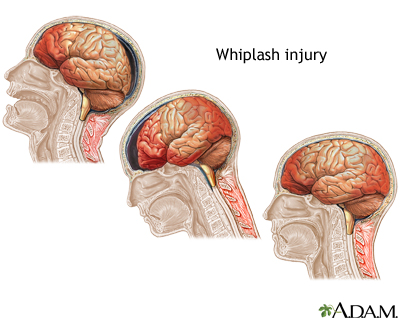Concussion - what to ask your doctor - adult
What to ask your doctor about concussion - adult; Adult brain injury - what to ask your doctor; Traumatic brain injury - what to ask the doctor
You had a concussion. This is a mild brain injury. It can affect how your brain works for a while.
Below are some questions you may want to ask your health care provider to help you take care of your concussion.

Head injury can occur when the head and neck is thrown violently such as in an accident. This type of head injury can also cause injury to the brain by causing it to rebound in the skull. As a result the brain may bleed, swell, and dangerously increase in pressure.
A pretty good bump on the head, or a violent collision, can leave you feeling woozy and confused, and with a splitting headache. If it's bad enough, you may even lose consciousness. So, what causes a concussion? Your brain is a delicate organ encased in bone, your skull. When you fall down, suffer violent contact during a sports activity, or hit your head in a car accident, your brain moves but has nowhere to go. Instead, it swirls around inside your head and bumps into your skull. This causes bruising that damages your brain. The classic symptom of a concussion is loss of consciousness. But many people might experience only a brief moment of amnesia or disorientation. Typically, you'll have a headache, feel sleepy, and you may even vomit. Most likely you will not be able to think straight, that is, maybe you can't remember the date or your name. You may see flashing lights and even feel like you've lost time. Sometimes, it may take a day or two after the blow for some symptoms to develop. Your doctor will do a physical exam, checking your pupils, your ability to think, your coordination, and your reflexes. The doctor may want to look for bleeding in your brain, so you may need a CT or MRI scan. You may also have a brain wave test, or EEG. So, how do we treat a concussion? First and foremost, you will need to rest and be watched -- sometimes in the hospital, and sometimes by a parent, friend, or spouse if you're at home. For your headache, you can take acetaminophen. You may need to eat a light diet for a while if you continue to feel sick, or feel like vomiting. You'll want to have someone stay with you for the first 12 to 24 hours after your concussion. It's okay to sleep, but someone should wake you up every few hours and ask you a simple question, such as your name, and then watch you for changes in how you look or act. Obviously, if you were playing sports when you received a concussion, you most likely will need to stop. Sometimes you can't return to a sport for weeks, or longer, especially if your symptoms don't improve. That's because once you've had a concussion, it's easier to get another one, and multiple concussions can lead to long-term brain damage.
Questions
What types of symptoms or problems will I have?
- Will I have problems thinking or remembering?
- Will I have a headache?
- How long will the symptoms last?
- Will all the symptoms and problems go away?
Does someone need to stay with me?
- For how long?
- Is it OK for me to go to sleep?
- If I go to sleep, does someone need to wake me up and check on me?
What type of activity can I do?
- Do I need to stay in bed or lie down?
- Can I do housework? How about yard work?
- When can I begin to exercise? When can I start contact sports, such as football or soccer? When can I begin skiing or snowboarding?
- Can I drive a car or operate other machinery?
When can I go back to work?
- What should I tell my boss about my concussion?
- Do I need to take special memory tests to determine if I am fit for work?
- Can I work a full day?
- Will I need to rest during the day?
What medicines can I use for pain or headache? Can I use aspirin, ibuprofen (Motrin or Advil), naproxen (Aleve, Naprosyn), or other similar medicines?
Is it OK to eat? Will I feel sick to my stomach?
When can I drink alcohol?
Do I need a follow-up appointment?
When should I contact my provider?
References
Brain Injury Association of America website. Adults: what to expect at home.
Dobkin BH. Neurological rehabilitation. In: Jankovic J, Mazziotta JC, Pomeroy SL, Newman NJ, eds. Bradley and Daroff's Neurology in Clinical Practice. 8th ed. Philadelphia, PA: Elsevier; 2022:chap 55.
Giza CC, Kutcher JS, Ashwal S, et al. Summary of evidence-based guideline update: evaluation and management of concussion in sports: report of the Guideline Development Subcommittee of the American Academy of Neurology. Neurology. 2013;80(24):2250-2257. PMID: 23508730
Papa L, Goldberg SA. Head trauma. In: Walls RM, ed. Rosen's Emergency Medicine: Concepts and Clinical Practice. 10th ed. Philadelphia, PA: Elsevier; 2023:chap 33.
Version Info
Last reviewed on: 10/23/2024
Reviewed by: Joseph V. Campellone, MD, Department of Neurology, Cooper Medical School at Rowan University, Camden, NJ. Review provided by VeriMed Healthcare Network. Also reviewed by David C. Dugdale, MD, Medical Director, Brenda Conaway, Editorial Director, and the A.D.A.M. Editorial team.
